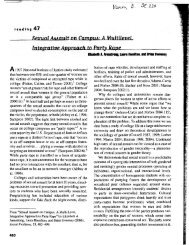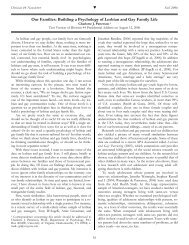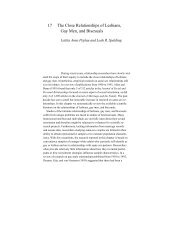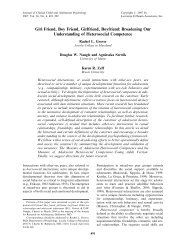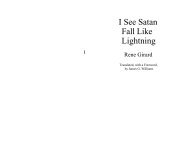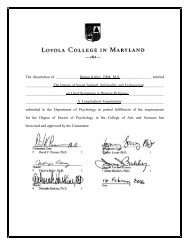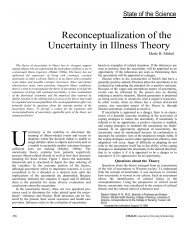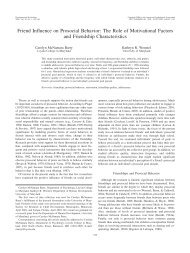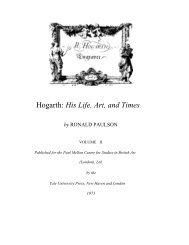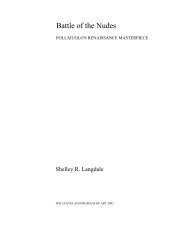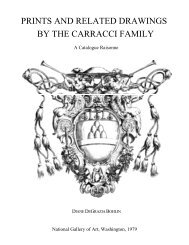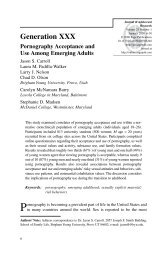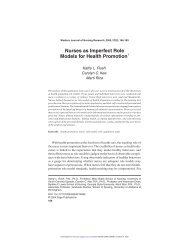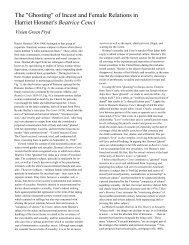The Social Explorer as Anthropologist: Victorian Travellers among ...
The Social Explorer as Anthropologist: Victorian Travellers among ...
The Social Explorer as Anthropologist: Victorian Travellers among ...
You also want an ePaper? Increase the reach of your titles
YUMPU automatically turns print PDFs into web optimized ePapers that Google loves.
to the explanation of certain anomalies in the present state of society<br />
<strong>among</strong> ourselves. That we, like the Kaffirs, Fellahs and Finns,<br />
are surrounded by wandering hordes—the 'sonqu<strong>as</strong>' and the<br />
'fingoes' of this country—paupers, beggars and out-<br />
c<strong>as</strong>ts. . . ." 17 Mayhew will, of course, go on to be the one to<br />
do just that, to treat the street-folk of London <strong>as</strong> an ethnol-<br />
ogist observing foreign tribes. Using categories determined<br />
by the perception of street-folk <strong>as</strong> a separate culture, he cat-<br />
alogues their histories, dress, food, religion, language, poli-<br />
tics, earnings, amusements, and education. <strong>The</strong> culture of<br />
the streets is not, however, monolithic in Mayhew's view:<br />
costermongers, prostitutes, pickpockets, watermen, and street-<br />
ballad sellers all have different ways of thinking and behaving,<br />
<strong>as</strong> well <strong>as</strong> working. In a section devoted to the "backwards<br />
slang" of costermongers Mayhew maintains the ethnologist's<br />
pose when he remarks that "in my present chapter the lan-<br />
guage h<strong>as</strong>, I believe, been reduced to orthography for the first<br />
time." 18 <strong>The</strong> costers' slang, Mayhew explains, is the result of<br />
their desire to "shield their bargainings at market, or their<br />
conversation . . . from the knowledge of any Irish or unini-<br />
tiated fellow-traders." 19 What appears a humorous or frivo-<br />
lous habit of speech to the "traveller" <strong>among</strong> the poor actually<br />
h<strong>as</strong> its origins in the structure and customs of labor.<br />
Mayhew takes an anthropologist's interest in the rules and<br />
mores that govern conjugal behavior <strong>among</strong> the street-folk.<br />
Costermen resemble North American Indians, he <strong>as</strong>serts, in<br />
their conduct toward their wives: they regard their women<br />
<strong>as</strong> "inexperienced servants" and punish female "disobedi-<br />
ence" with physical abuse. 20 Among certain street-sellers ma-<br />
trimony is regarded <strong>as</strong> a w<strong>as</strong>te of time and money: only one-<br />
tenth of all coster couples are legally married, and fidelity is<br />
<strong>as</strong> common <strong>among</strong> the unwed <strong>as</strong> <strong>among</strong> the wed. 21 But May-<br />
hew wishes to emph<strong>as</strong>ize that financial prohibitions make<br />
wedlock an undesirable choice. In Clerkenwell, he adds by<br />
way of evidence, <strong>as</strong> many <strong>as</strong> one-fifth of all coster couples do<br />
marry, quite simply because the incumbent of the parish<br />
marries them free of charge at Advent and E<strong>as</strong>ter. If notions<br />
of morality <strong>among</strong> these people "agree strongly . . . with those<br />
of many savage tribes," if these "Nomades of England neither<br />
130



